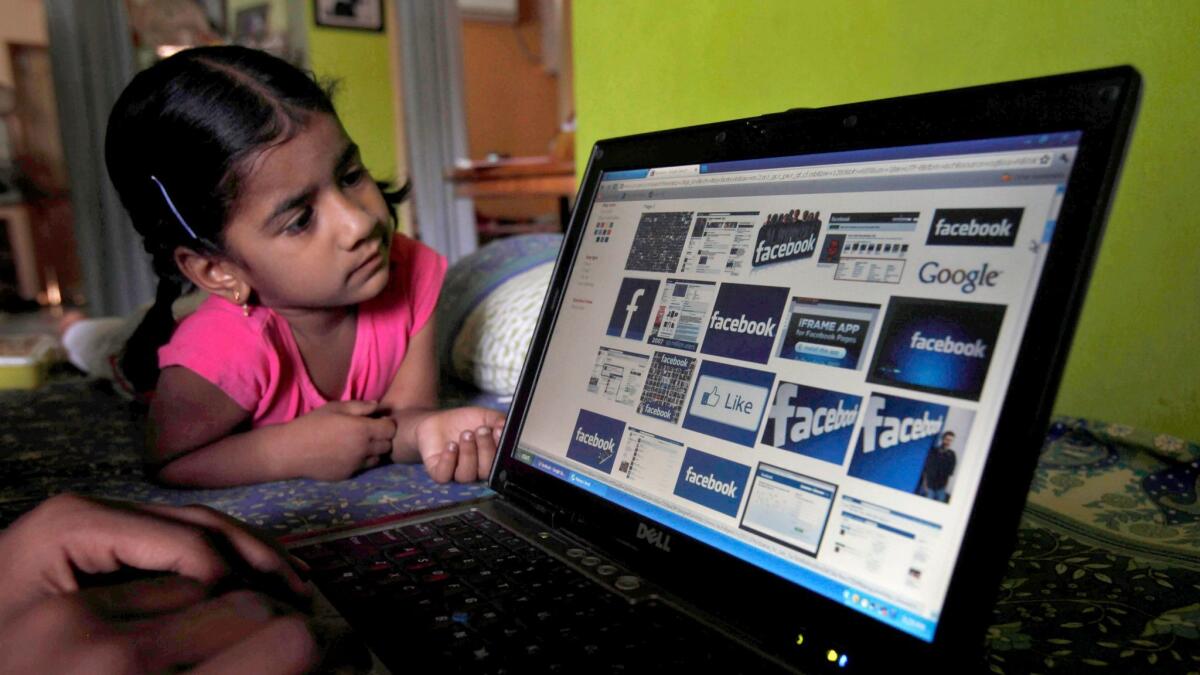Op-Ed: A bad message for kids: ‘Be yourself, just not online’

- Share via
American adults have long told teenagers to “just be yourself.” As parents and mentors, we want the young people in our lives to grow up confident, to show and celebrate who they really are. We insist that anyone who would reject their tender, complicated souls is simply not worth their while.
But lately we’ve added a new tagline to this rule: You be you — just don’t be you online. Because many teenagers now experience life as much online as off, that means: You be you — roughly half the time. During the other half, it’s better to filter out the grit.
There’s a cost to this advice, however well-meaning it may be. In an online survey I conducted with college students across the United States, 78% of respondents said they “worry about how negative posts might look to future employers.” And 73% answered “yes” to the statement: “I try always to appear positive/happy with anything attached to my name.” Young adults have learned that it’s paramount to appear happy, sunny and successful, no matter how they’re feeling.
It’s not hard to understand why concerned parents, coaches and teachers would endorse self-censorship. We’re all worried that young adults will get hurt by rampant online cruelty, or post something compromising that will damage their prospects. An offending post that raises eyebrows can be the difference between acceptance and rejection. One misstep and all your dreams might vanish, the thinking goes, so no one can afford to “just be yourself.”
An online record should be “spotless,” according to Aamir, one of the college first-years I interviewed for that nationwide study. Aamir began receiving this advice in middle school. One student after the other spoke of how they had learned to “craft,” “curate” and “cultivate” their online images.
We are a country engaged in a debate about...what is real and what is fake. Meanwhile our young people are learning the importance of full-time, online spin.
Painting ourselves in a positive light isn’t unusual. We put on makeup, smile at people on the street. But the students I interviewed and surveyed have been trained to believe that anything slightly negative or eyebrow-raising (think an 18-year-old holding a plastic cup that might contain beer) is dangerous to one’s reputation. Young adults like Aamir are working hard to do “Facebook cleanups.”
Of course it’s not just adults who are telling young people to edit their online selves; there’s peer pressure in the same direction. Students spoke about social media as a kind of popularity contest and about how so much of posting is about showing not only your classmates, but also your “audience” and wider “public” how socially desirable you are. (Yes, the students used these terms.) Posting gorgeous photos filled with friends accompanied by high numbers of “likes” is also a way of building one’s name “brand” — “just like Kellogg’s or Ford or Nike” one student said.
One big problem here is that maintaining the appearance of perfection is stressful — and not only for the owner of the Facebook profile or Instagram feed. It’s also stressful for whoever’s looking at that profile or feed. Going on social media involves exposing oneself to a nonstop highlight reel of enviable moments.
It’s only human to feel left out and unattractive sometimes, to wish for a better body, more stylish clothes, more opportunities. On our best days, we can celebrate our friends’ wonderful experiences. On the worst ones, we don’t want to hear about all that. We need comfort and empathy — we need to hear that our friends have troubles, too.
But Instagram is incapable of empathy. Twitter has no heart. Facebook “friends” have no way of sensing that you’re having a bad day, that you just got rejected from your dream school, that you’re heartbroken. In person, a good friend would never show off her acceptance letter to the college that rejected you. On Facebook, that good friend has no way of knowing that you’re weeping, so she displays it proudly, and an algorithm bumps the post to the top of your feed.
One young woman I interviewed told me that going online was like a daily comparison of the worst version of herself versus the best version of everyone else. Another person called social media an endless “happiness competition.” Yet another said: “It’s kind of like … [a] high school reunion. [You] want to go back and show how great [your] life is. It’s like that now, but you don’t have to wait for your 10-year reunion. It’s like that every day.”
In their desire to protect their futures, young adults are filtering out reality, tamping down their emotions and steeling themselves against one of the most human qualities we all share: vulnerability.
We are a country engaged in a debate about the importance of truth, of what is real and what is fake. Meanwhile our young people are learning the importance of full-time, online spin, the art of creating profiles replete with “alternative facts” — updates that may not exactly be false, but that certainly leave out the whole truth in the service of pleasing potentially powerful audiences. The long-term effects of the message “be you, just not online,” might have a higher price tag than we have yet to comprehend.
Donna Freitas is the author most recently of “The Happiness Effect.”
Follow the Opinion section on Twitter @latimesopinion or Facebook
A cure for the common opinion
Get thought-provoking perspectives with our weekly newsletter.
You may occasionally receive promotional content from the Los Angeles Times.



